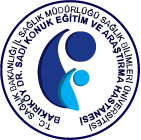ABSTRACT
Objective:
Hand-Foot-Mouth disease (HFMD) is a contagious enteroviral infection occurring primarily in children and characterized by vesicular palmoplantar eruptions and erosive stomatitis. The aim of this retrospective study is to describe the clinical features and seasonal distribution of the HFMD cases which are diagnosed between 1 June 2011 and 31 May 2011 in our clinic.
Material and Methods:
Among the patients admitted to our Pediatric Dermatology clinic between 1 June 2011-31 May 2012, HFMD patients were clinically diagnosed. Patients were retrospectively analyzed for gender, age, affected zones, associated symptoms and reference time (months -seasons). Mann-Whitney U test was performed for statistical analyses.
Results:
Between 1 June 2011 and 31 May 2012, 6153 patients admitted to our Pediatric Dermatology clinic and 21 cases of HFMD were detected. Mean age was 5.38 years (range 1- 12 years) and both sexes were equally affected (11 girl; 10 boy). The most common symptoms were rash (100%) and mild fever (76.2%). Rash was distributed on both surfaces of hands and feet (%100) in all of the cases; also it was mostly seen on oral mucosa (90.5%) and over buttocks (80.9%). Disease was seen mostly in the month of August (n=5) and October (n=5) while summer (n=8) and autumn (n=8) were the most frequent seasons. There were no complications among the patients.
Conclusion:
HFMD is a common infectious disease that occurs in particular seasons in childhood. As well as hand, foot and oral mucosal involvement, gluteal region involvement is common. Early diagnosis of disease can be made with the characteristic clinical findings; laboratory tests for diagnosis is not necessary. Since the symptoms are mild, symptomatic treatment is sufficient. Generally, recovery of disease can be completed without any complication; however patients must be followed up further especially for cardiac and neurological involvement. Since HFMD was seen frequently in summer, to prevent spread of the disease and possible complications, patients and their relatives should be educated for hygiene and contagiousity of disease.



